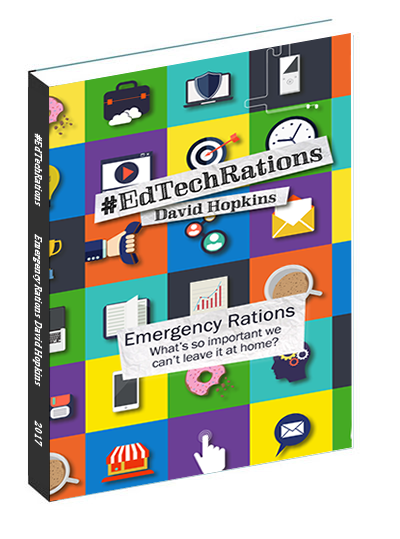The Future of eBooks … my vision
I’ve been pondering whether or not to get a Kindle since I heard about the latest wifi or 3G version … so long in fact that both my parents have now passed me and got one each! I may not have such a device, but I have shown them how to connect them to their home wireless broadband and download books.
I am still unsure as to if, not when, I will get a Kindle. My reason is that I have installed the Kindle app for my iPhone and can download and read Kindle books like that, as well as link it the the Whispersync system and read them on my laptop (should I wish). I am toying with an iPad, which will also use the Kindle for iPhone app, therefore continue my reading in this medium … which is where a tablet eReader will outperform an eInk one. Let me explain.
This thought first came to me from my work and reading around the use of QR Codes in education, where a QR Code is displayed in the paper-version of the academic textbook so the student can find online video or web links of the content / theory / etc the chapter or page is currently explaining. What if this is ported to non-fiction and fiction books as well? You could have an interactive version of Jules Verne’s “Around the World in 80 Days” where you could:
- link to maps of the city where the characters have just arrived (ancient as well as current maps, Google maps anyone?),
- images and video of the different areas where they find themselves,
- video clips of film version of the book (1956 & 2004, as well as Michael Palin’s BBC adventure in 1989),
- link to explanations of language and dialects that may be difficult to understand their meaning
Well, why not?
Here’s a few suggestions for the kind of content I see in something like ‘Around the World in 80 Days’:
[Note: images I’d previously loaded here were lost when I migrated the blog to a new server. The were mock-ups of a digital screen showing the text of the ‘Around the World in 80 Days’ book, hyperlinks and expandable margins with notes, videos, geo-location data, etc. all particularly noted for the section/chapter of the book, the character on the page, the history of the city, method of transport, etc. I’m sad these images have been lost as the perfectly showcased this idea.]
For new books it would be harder to be written without a back-up team generating and finding the copyright to the various different digital elements you wanted to use, and for the publication of older books (like the Around the World in 80 Days’ I downloaded for free) would be costly for not much return … but just think what it could do for the younger readers, it could really bring a story alive, in the original text (not cut-down film version), in a more modern & multi-media way.
- Update: May 6th, 2011
This is the kind of thing I was talking about in the original post here – a ‘new’ eBook standard demonstrated by PushPopPress;
Al Gore’s Our Choice Guided Tour from Push Pop Press on Vimeo.


















At the moment its quite depressing the lack of forward thinking in ebooks. Effectively most are published merely as electronic text then DRMd to make them more useless. It needs some brave soul to show the real potential of the ebook and then it will become a whole new media style.
Roger. Thanks for the reply, and I totally agree with you – it will take one brave soul (publisher) to start the migration but it surely can’t be too long before the market starts demanding it, especially with all the new technology (Kindle, tablets, etc) that are proposed?
All the best, David.
I’m waiting for the second version of the iPad but it’s not just about the technology. The real thing holding me back is that e-books do mean buying my books at whatever price the big booksellers decide. With print, I can borrow from the library, share books with friends and buy second hand. Until DRM and lending is sorted then the the e-book option is just too expensive for anyone, like me, who has a reading habit to support.
Library Renewal is a new US campaign to find new e-content solutions for libraries – this is a make or break issue for libraries. Publishers and online booksellers are shaping the market to suit themselves (naturally enough) and are putting in place barriers to library lending of e-content. Most readers are borrowers as well as buyers, so a mixed model for delivering e-content is in all our interests.
BTW There’s an app for Bram Stoker’s Dracula – I haven’t seen this myself but looks interesting. http://uk.wireless.ign.com/articles/112/1120772p1.html. There are some lovely digital picture books and Puffin has launched the Puffin Digital prize http://thepenguinblog.typepad.com/the_penguin_blog/2010/11/today-is-an-incredibly-exciting-day-today-is-the-launch-of-the-puffin-digital-prize-and-a-brave-new-world-for-puffin-picture.html
I have updated this post with the details and video of the PushPopPress ( @PushPopPress:twitter ) iPhone/iPad app that is exactly the kind of eBook I envisaged. Just think how amazing this would make textbooks, classic literature, etc, and how engaged the students would be, being able to access this any where and any time?
Come on, let’s get to it!!